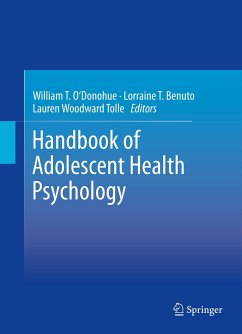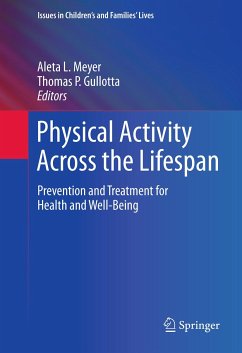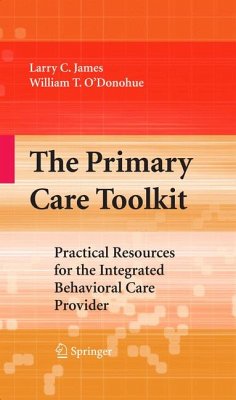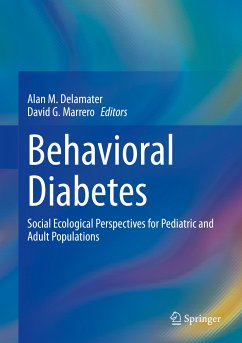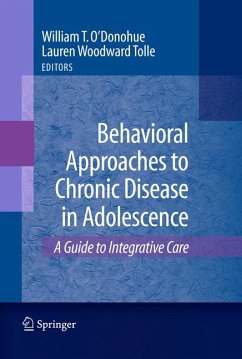
Behavioral Approaches to Chronic Disease in Adolescence (eBook, PDF)
A Guide to Integrative Care
Redaktion: O'Donohue, William
Versandkostenfrei!
Sofort per Download lieferbar
72,95 €
inkl. MwSt.
Weitere Ausgaben:

PAYBACK Punkte
36 °P sammeln!
Adolescence is typically fraught with problems, even under optimal conditions. And when chronic illness is added to the picture, medical and related social issues can complicate, and even disrupt, the course of development. The first text geared toward the integrated care setting, Behavioral Approaches to Chronic Disease in Adolescence offers clinicians an evidence-based guide to helping their young clients manage their chronic conditions and treating the psychosocial effects-from school problems and stigma to noncompliance and depression-that frequently follow diagnosis. Expert contributors p...
Adolescence is typically fraught with problems, even under optimal conditions. And when chronic illness is added to the picture, medical and related social issues can complicate, and even disrupt, the course of development. The first text geared toward the integrated care setting, Behavioral Approaches to Chronic Disease in Adolescence offers clinicians an evidence-based guide to helping their young clients manage their chronic conditions and treating the psychosocial effects-from school problems and stigma to noncompliance and depression-that frequently follow diagnosis. Expert contributors present up-to-date information on epidemiology, symptoms, comorbid psychosocial problems, and treatment options for a variety of common illnesses, arranged to foster effective interventions for adolescents and efficient collaboration with other care providers in the team. Coverage is comprehensive, authoritative, and accessible, ensuring best practice while respecting each client's individuality: Empirically-based treatment guidelines for illnesses commonly found in youth, including Type 1 and 2 diabetes, asthma, cancer, obesity, and chronic pain. Overview of the physiology of adolescence, particularly as it may be affected by medical conditions, and of adolescent brain development. Latest findings on the role of families in teens' adjustment to illness and treatment. Cultural considerations affecting ethnically diverse clients and their families. Detailed discussions of ethical issues relevant to treating chronically ill young people, and of controversies involving pharmacotherapy with this population. Chapters contain useful handouts for clinicians and clients. Taking Care of the Practitioner" chapter with helpful strategies for avoiding burnout. Its emphasis on specific practical information makes Behavioral Approaches to Chronic Disease in Adolescence a "go-to" reference for health psychologists, child and adolescent mental health practitioners, pediatriciansand family practitioners, and clinical social workers.
Dieser Download kann aus rechtlichen Gründen nur mit Rechnungsadresse in A, B, BG, CY, CZ, D, DK, EW, E, FIN, F, GR, HR, H, IRL, I, LT, L, LR, M, NL, PL, P, R, S, SLO, SK ausgeliefert werden.




